ECO-Tourism Report: Principles, Concepts, and Sustainable Development
VerifiedAdded on 2022/12/30
|6
|804
|89
Report
AI Summary
This report provides an overview of ecotourism, defining it as a form of tourism designed to minimize environmental impact and avoid large-scale development negatives. It focuses on the principles of ecotourism, highlighting its role in sustainable tourism and stakeholder development. The report discusses various principles such as reducing negative impacts, building awareness, providing positive experiences, financial benefits, and low-impact facilities. It emphasizes the importance of stakeholder involvement, including communities, tour operators, and government institutions, in planning, development, implementation, and monitoring. The report also underscores how ecotourism principles impact stakeholders by building trust and encouraging investment. Finally, the report concludes that the active participation of stakeholders and the monitoring of consequences are essential for achieving ecotourism goals, enhancing sustainable stakeholder development.
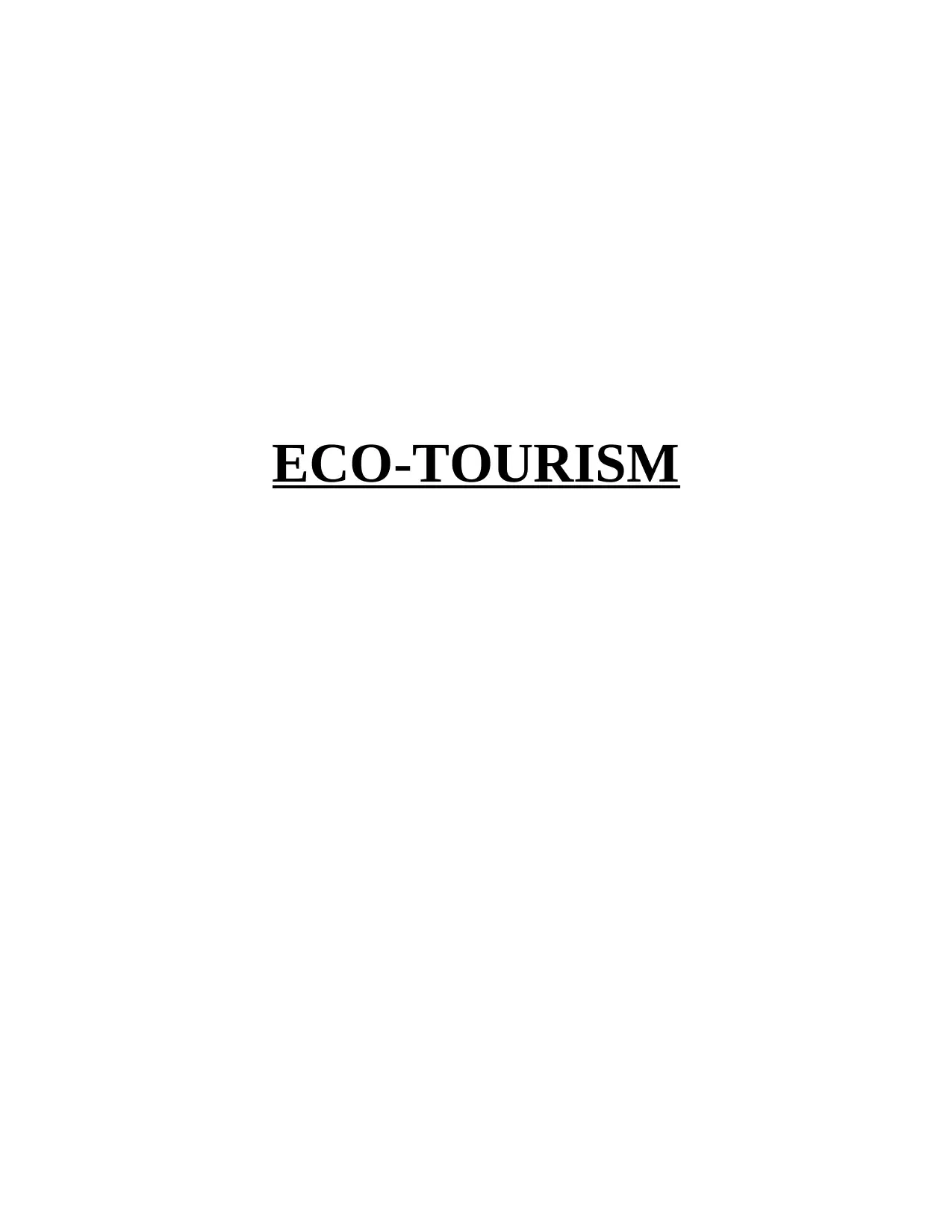
ECO-TOURISM
Paraphrase This Document
Need a fresh take? Get an instant paraphrase of this document with our AI Paraphraser
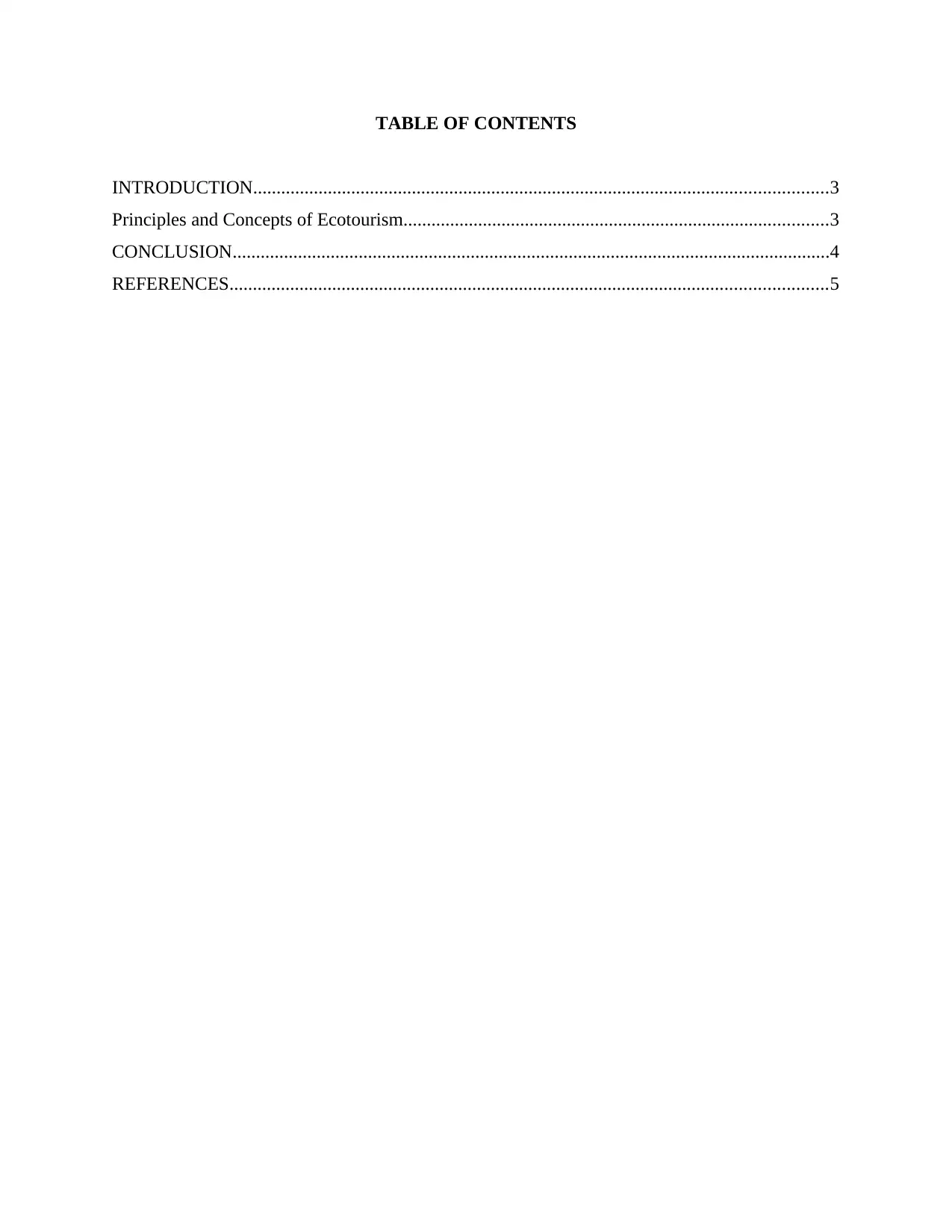
TABLE OF CONTENTS
INTRODUCTION...........................................................................................................................3
Principles and Concepts of Ecotourism...........................................................................................3
CONCLUSION................................................................................................................................4
REFERENCES................................................................................................................................5
INTRODUCTION...........................................................................................................................3
Principles and Concepts of Ecotourism...........................................................................................3
CONCLUSION................................................................................................................................4
REFERENCES................................................................................................................................5
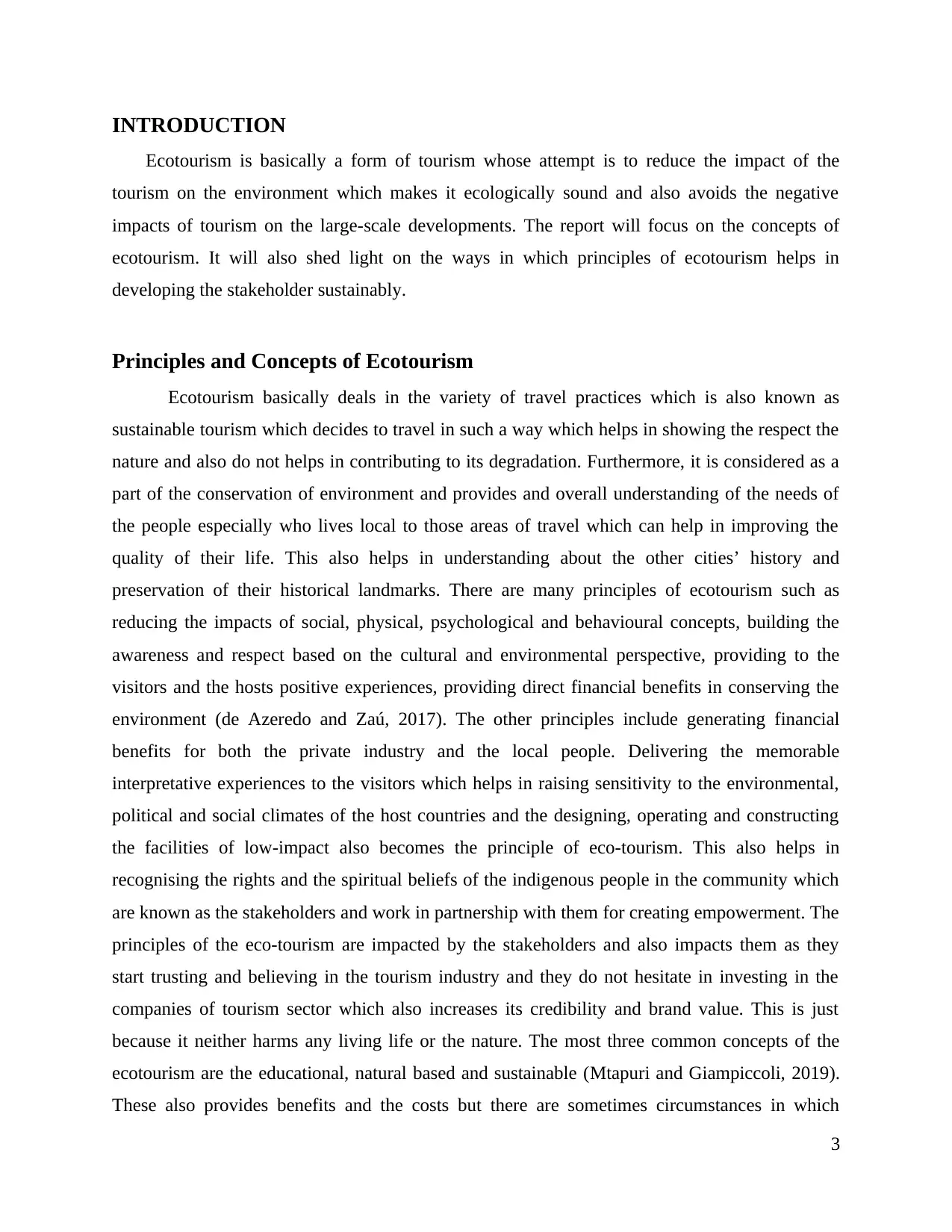
INTRODUCTION
Ecotourism is basically a form of tourism whose attempt is to reduce the impact of the
tourism on the environment which makes it ecologically sound and also avoids the negative
impacts of tourism on the large-scale developments. The report will focus on the concepts of
ecotourism. It will also shed light on the ways in which principles of ecotourism helps in
developing the stakeholder sustainably.
Principles and Concepts of Ecotourism
Ecotourism basically deals in the variety of travel practices which is also known as
sustainable tourism which decides to travel in such a way which helps in showing the respect the
nature and also do not helps in contributing to its degradation. Furthermore, it is considered as a
part of the conservation of environment and provides and overall understanding of the needs of
the people especially who lives local to those areas of travel which can help in improving the
quality of their life. This also helps in understanding about the other cities’ history and
preservation of their historical landmarks. There are many principles of ecotourism such as
reducing the impacts of social, physical, psychological and behavioural concepts, building the
awareness and respect based on the cultural and environmental perspective, providing to the
visitors and the hosts positive experiences, providing direct financial benefits in conserving the
environment (de Azeredo and Zaú, 2017). The other principles include generating financial
benefits for both the private industry and the local people. Delivering the memorable
interpretative experiences to the visitors which helps in raising sensitivity to the environmental,
political and social climates of the host countries and the designing, operating and constructing
the facilities of low-impact also becomes the principle of eco-tourism. This also helps in
recognising the rights and the spiritual beliefs of the indigenous people in the community which
are known as the stakeholders and work in partnership with them for creating empowerment. The
principles of the eco-tourism are impacted by the stakeholders and also impacts them as they
start trusting and believing in the tourism industry and they do not hesitate in investing in the
companies of tourism sector which also increases its credibility and brand value. This is just
because it neither harms any living life or the nature. The most three common concepts of the
ecotourism are the educational, natural based and sustainable (Mtapuri and Giampiccoli, 2019).
These also provides benefits and the costs but there are sometimes circumstances in which
3
Ecotourism is basically a form of tourism whose attempt is to reduce the impact of the
tourism on the environment which makes it ecologically sound and also avoids the negative
impacts of tourism on the large-scale developments. The report will focus on the concepts of
ecotourism. It will also shed light on the ways in which principles of ecotourism helps in
developing the stakeholder sustainably.
Principles and Concepts of Ecotourism
Ecotourism basically deals in the variety of travel practices which is also known as
sustainable tourism which decides to travel in such a way which helps in showing the respect the
nature and also do not helps in contributing to its degradation. Furthermore, it is considered as a
part of the conservation of environment and provides and overall understanding of the needs of
the people especially who lives local to those areas of travel which can help in improving the
quality of their life. This also helps in understanding about the other cities’ history and
preservation of their historical landmarks. There are many principles of ecotourism such as
reducing the impacts of social, physical, psychological and behavioural concepts, building the
awareness and respect based on the cultural and environmental perspective, providing to the
visitors and the hosts positive experiences, providing direct financial benefits in conserving the
environment (de Azeredo and Zaú, 2017). The other principles include generating financial
benefits for both the private industry and the local people. Delivering the memorable
interpretative experiences to the visitors which helps in raising sensitivity to the environmental,
political and social climates of the host countries and the designing, operating and constructing
the facilities of low-impact also becomes the principle of eco-tourism. This also helps in
recognising the rights and the spiritual beliefs of the indigenous people in the community which
are known as the stakeholders and work in partnership with them for creating empowerment. The
principles of the eco-tourism are impacted by the stakeholders and also impacts them as they
start trusting and believing in the tourism industry and they do not hesitate in investing in the
companies of tourism sector which also increases its credibility and brand value. This is just
because it neither harms any living life or the nature. The most three common concepts of the
ecotourism are the educational, natural based and sustainable (Mtapuri and Giampiccoli, 2019).
These also provides benefits and the costs but there are sometimes circumstances in which
3
⊘ This is a preview!⊘
Do you want full access?
Subscribe today to unlock all pages.

Trusted by 1+ million students worldwide
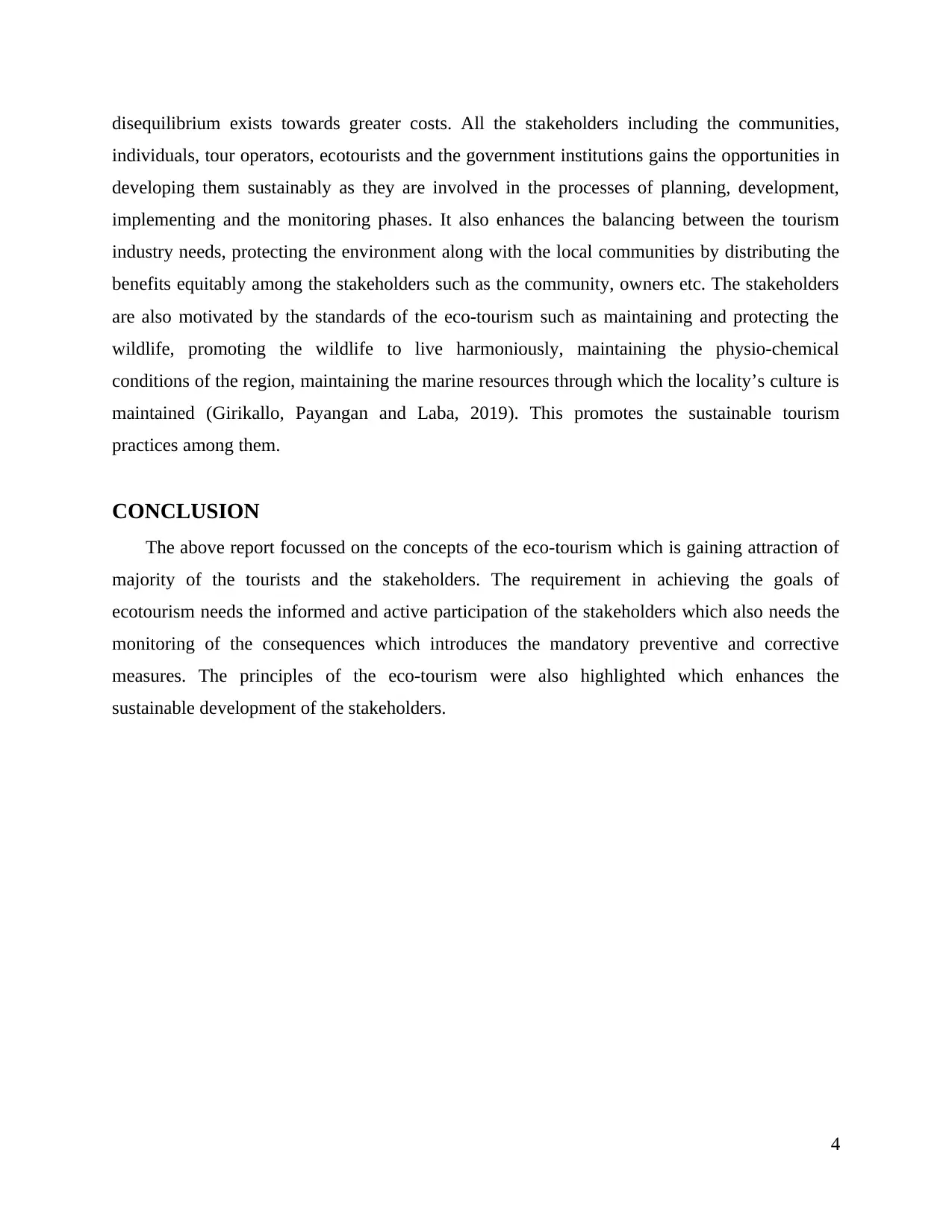
disequilibrium exists towards greater costs. All the stakeholders including the communities,
individuals, tour operators, ecotourists and the government institutions gains the opportunities in
developing them sustainably as they are involved in the processes of planning, development,
implementing and the monitoring phases. It also enhances the balancing between the tourism
industry needs, protecting the environment along with the local communities by distributing the
benefits equitably among the stakeholders such as the community, owners etc. The stakeholders
are also motivated by the standards of the eco-tourism such as maintaining and protecting the
wildlife, promoting the wildlife to live harmoniously, maintaining the physio-chemical
conditions of the region, maintaining the marine resources through which the locality’s culture is
maintained (Girikallo, Payangan and Laba, 2019). This promotes the sustainable tourism
practices among them.
CONCLUSION
The above report focussed on the concepts of the eco-tourism which is gaining attraction of
majority of the tourists and the stakeholders. The requirement in achieving the goals of
ecotourism needs the informed and active participation of the stakeholders which also needs the
monitoring of the consequences which introduces the mandatory preventive and corrective
measures. The principles of the eco-tourism were also highlighted which enhances the
sustainable development of the stakeholders.
4
individuals, tour operators, ecotourists and the government institutions gains the opportunities in
developing them sustainably as they are involved in the processes of planning, development,
implementing and the monitoring phases. It also enhances the balancing between the tourism
industry needs, protecting the environment along with the local communities by distributing the
benefits equitably among the stakeholders such as the community, owners etc. The stakeholders
are also motivated by the standards of the eco-tourism such as maintaining and protecting the
wildlife, promoting the wildlife to live harmoniously, maintaining the physio-chemical
conditions of the region, maintaining the marine resources through which the locality’s culture is
maintained (Girikallo, Payangan and Laba, 2019). This promotes the sustainable tourism
practices among them.
CONCLUSION
The above report focussed on the concepts of the eco-tourism which is gaining attraction of
majority of the tourists and the stakeholders. The requirement in achieving the goals of
ecotourism needs the informed and active participation of the stakeholders which also needs the
monitoring of the consequences which introduces the mandatory preventive and corrective
measures. The principles of the eco-tourism were also highlighted which enhances the
sustainable development of the stakeholders.
4
Paraphrase This Document
Need a fresh take? Get an instant paraphrase of this document with our AI Paraphraser
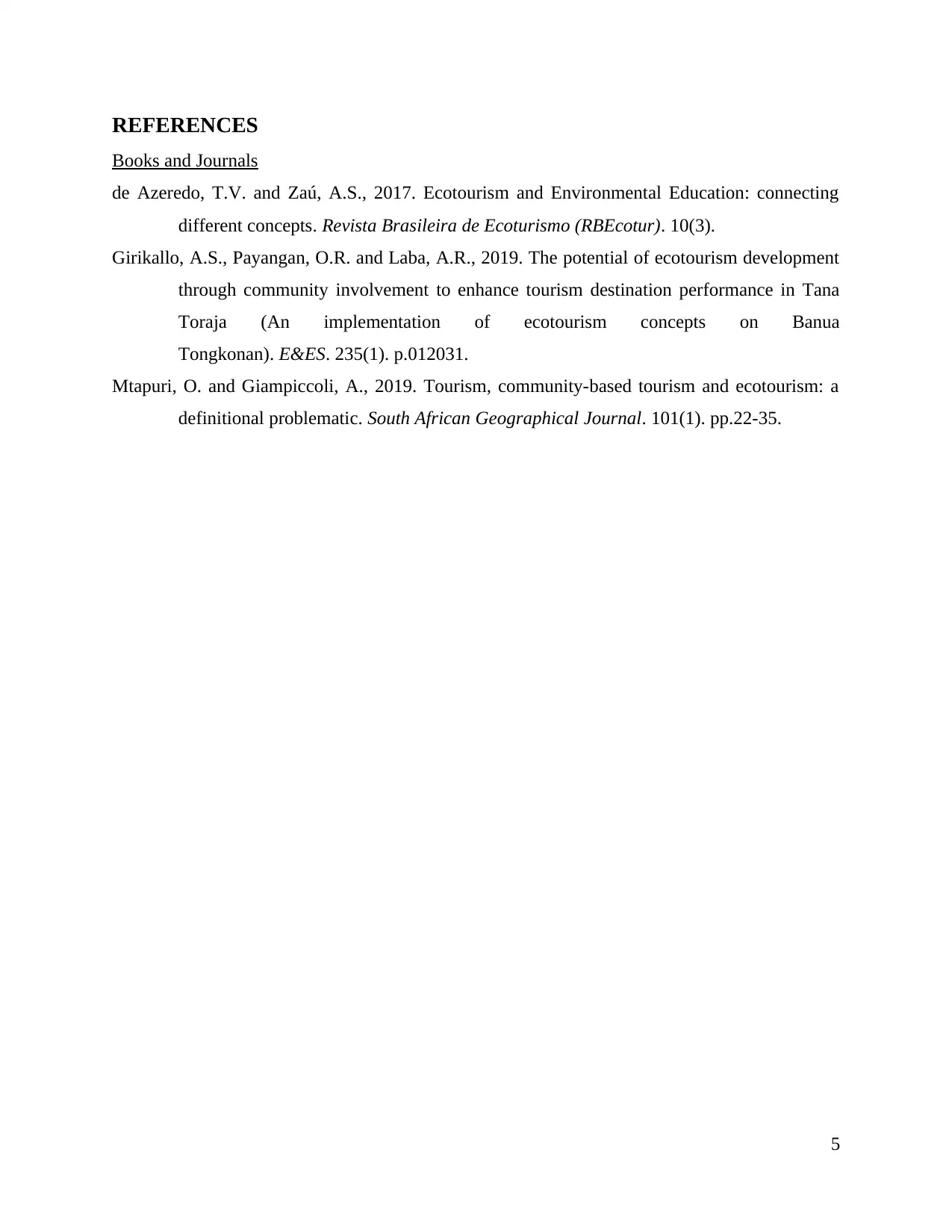
REFERENCES
Books and Journals
de Azeredo, T.V. and Zaú, A.S., 2017. Ecotourism and Environmental Education: connecting
different concepts. Revista Brasileira de Ecoturismo (RBEcotur). 10(3).
Girikallo, A.S., Payangan, O.R. and Laba, A.R., 2019. The potential of ecotourism development
through community involvement to enhance tourism destination performance in Tana
Toraja (An implementation of ecotourism concepts on Banua
Tongkonan). E&ES. 235(1). p.012031.
Mtapuri, O. and Giampiccoli, A., 2019. Tourism, community-based tourism and ecotourism: a
definitional problematic. South African Geographical Journal. 101(1). pp.22-35.
5
Books and Journals
de Azeredo, T.V. and Zaú, A.S., 2017. Ecotourism and Environmental Education: connecting
different concepts. Revista Brasileira de Ecoturismo (RBEcotur). 10(3).
Girikallo, A.S., Payangan, O.R. and Laba, A.R., 2019. The potential of ecotourism development
through community involvement to enhance tourism destination performance in Tana
Toraja (An implementation of ecotourism concepts on Banua
Tongkonan). E&ES. 235(1). p.012031.
Mtapuri, O. and Giampiccoli, A., 2019. Tourism, community-based tourism and ecotourism: a
definitional problematic. South African Geographical Journal. 101(1). pp.22-35.
5

6
⊘ This is a preview!⊘
Do you want full access?
Subscribe today to unlock all pages.

Trusted by 1+ million students worldwide
1 out of 6
Related Documents
Your All-in-One AI-Powered Toolkit for Academic Success.
+13062052269
info@desklib.com
Available 24*7 on WhatsApp / Email
![[object Object]](/_next/static/media/star-bottom.7253800d.svg)
Unlock your academic potential
Copyright © 2020–2026 A2Z Services. All Rights Reserved. Developed and managed by ZUCOL.




